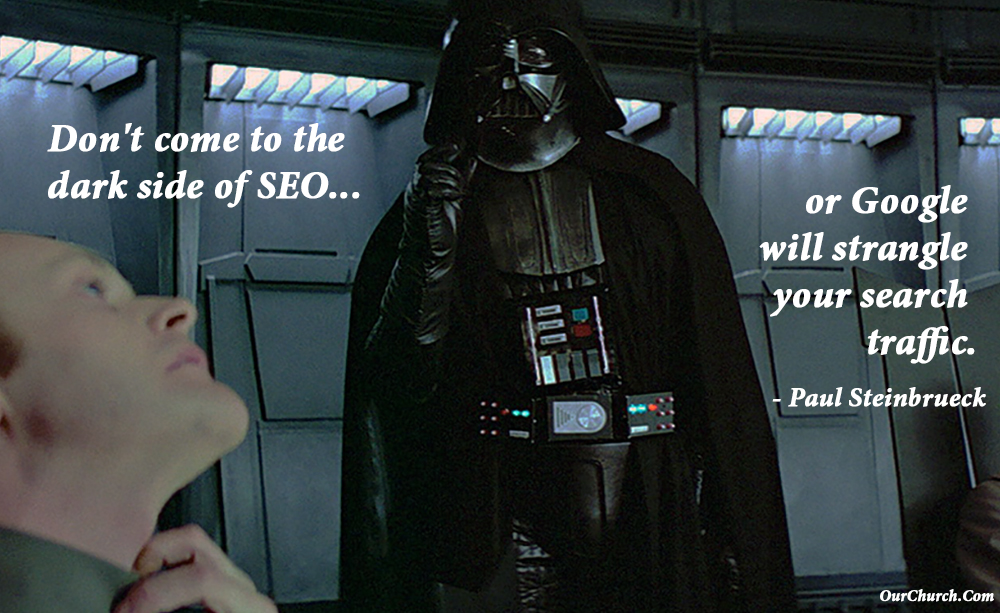In this Search Engine Optimization Frequently Asked Questions (SEO FAQs) video blog, I address the question, What is black hat SEO? and explain 4 black had SEO tactics to avoid.
(The article below is a summary of the video, but you’ll get more details and examples if you watch the video.)
What is “black hat” SEO?
Let’s dive into the world of SEO and uncover the dark side of it.
The term “black hat” harks back to the old Western movies where the good guys wore white hats and the bad guys sported black ones. This distinction made it easy to identify the heroes and villains.
In the late ’90s and early 2000s, the world of SEO was like the Wild West, and people were experimenting with various techniques – some ethical, and some not so ethical – to boost their search engine rankings. Those unethical tactics that search engines frowned upon became known as black hat SEO.
It’s essential to grasp the concept of black hat SEO because when you hire an SEO company, you want to ensure they’re not using these techniques. Black hat methods can lead to penalties and even the banning of your website from search engines. So, let’s explore four specific black hat SEO techniques you should steer clear of.
1. Keyword Stuffing
On-page optimization is essential for enhancing a webpage’s relevance for specific keywords. However, keyword stuffing takes this to an extreme, where keywords are used excessively throughout a page, often in awkward and unnatural ways. Some even resort to listing keywords at the bottom of the page. Keyword stuffing is no longer effective, as search engines can identify it. So, avoid this practice at all costs.
2. Cloaking
Cloaking is a practice where one version of a webpage is displayed to search engines, while a different version is shown to human visitors. The idea is to present an overly optimized version to search engines, sacrificing user-friendliness. This technique is explicitly banned and should be avoided.
3. Link Buying
Link building is a challenging aspect of SEO. It’s tough to convince other websites to link to your site. Some SEO companies take the shortcut by buying links on other websites. However, this practice is explicitly prohibited by search engines. If detected, these purchased links won’t help your site’s authority or rankings; in fact, they might lead to penalties. Avoid buying links at all costs.
4. Link Schemes
Since buying links is against the rules, some SEO companies have come up with alternative link-building schemes. These include reciprocal linking, where websites agree to exchange links, and blog networks, where multiple blogs are created to interlink with client sites. It’s crucial to ensure that your SEO company is not using these questionable techniques. Ask them about their link-building strategies to be sure.
Understanding what black hat SEO is and avoiding it is crucial for your website’s success. When hiring an SEO company, make sure they follow ethical practices.
The bottom line is…
Don’t come to the dark side of SEO… or Google will strangle your search traffic. -Paul Steinbrueck

Of course, OurChurch.com is committed to using only legitimate, ethical, “white hat” SEO techniques to help our clients improve their search rankings, increase their website traffic, and live out their mission online.
If you’d like to discuss church SEO or Christian SEO for your business, school or ministry, with one of our SEO experts, fill out the consultation request form below.
Comment and Discuss…
- What questions or comments do you have about black hat SEO?



3 Comments
Kurt & Mark,
Very informative!
Very rarely do I watch a video over 3 minutes, but I learn a lot from you guys about what not to do. Thanks for the info and keep up the great work!…private blog networks….never heard of it, but I know not to get involve!
I can always use some help as I try to help spread the gospel across the world…GB!
Thanks Tony!
Very informative